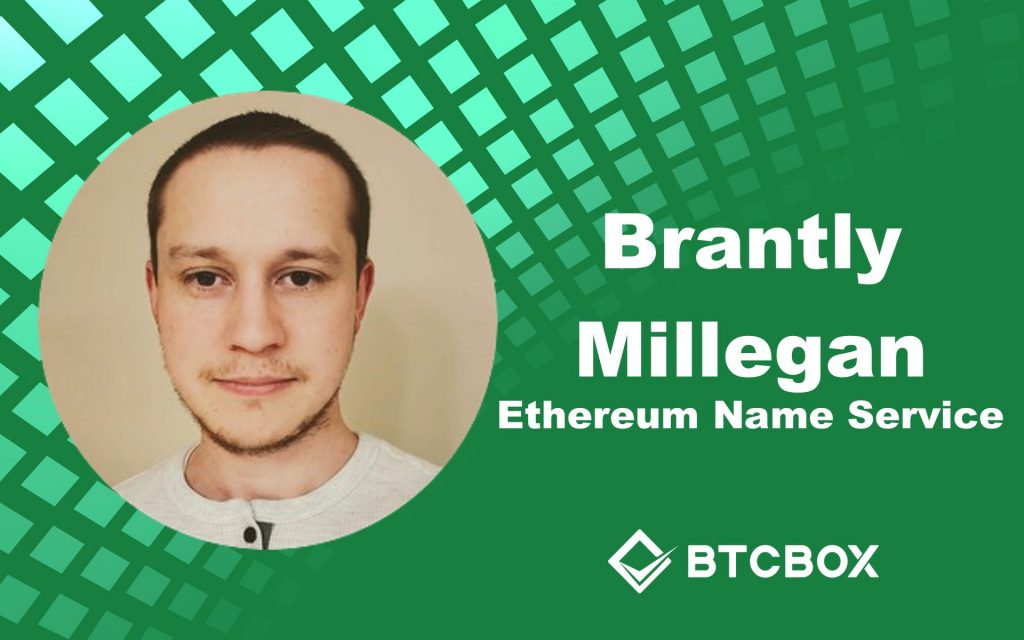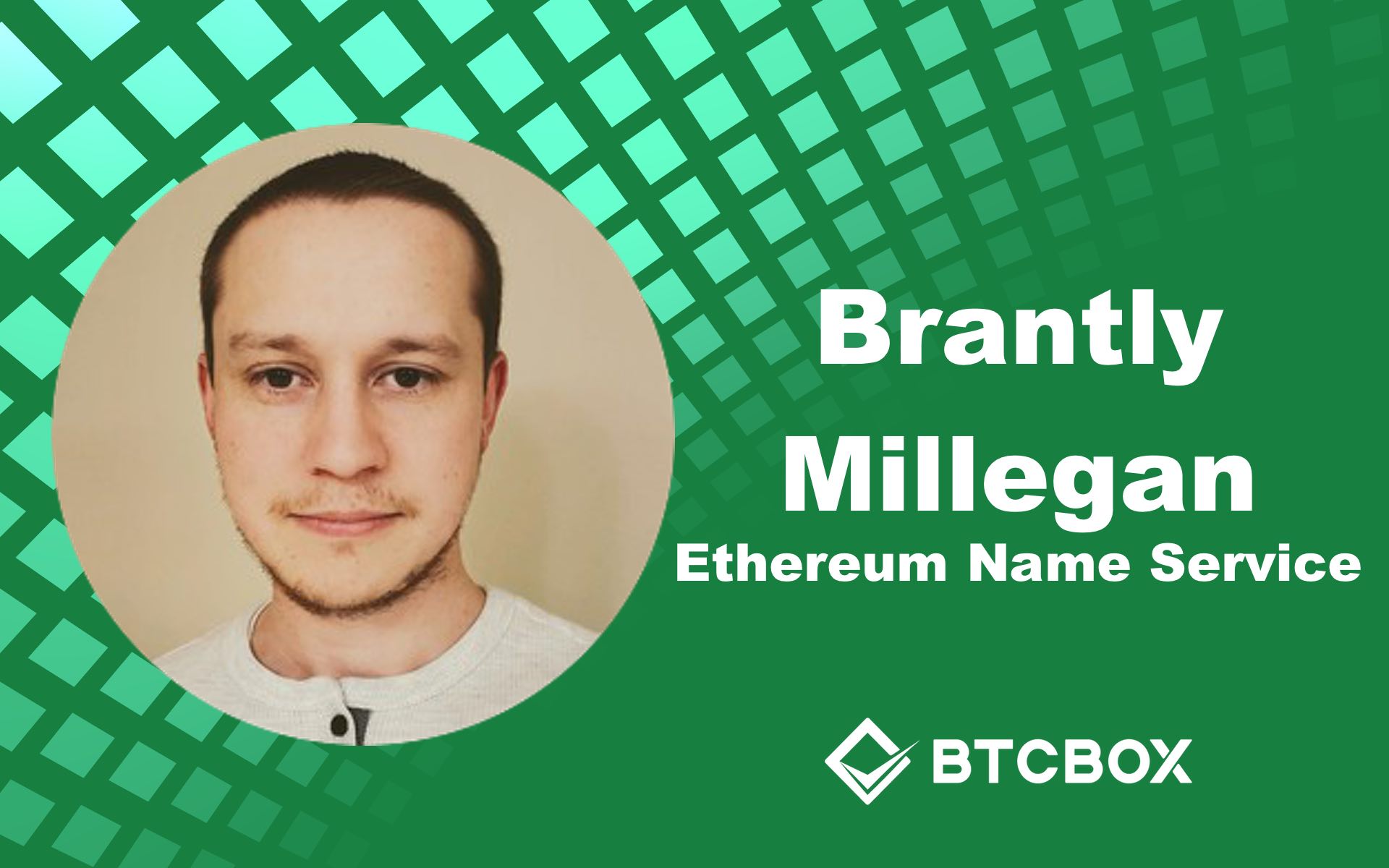
Brantly Millegan is Director of Operations at Ethereum Name Service. ENS is a crypto decentralized domain naming service. It allows for addressing resources both on and off the blockchain using simple, human-readable names. Very similar to DNS, but it censorship resistant, and also can be used in the NFT market as well as all the Ethereum projects.
Interview Date : 4th December 2020
Interview with Brantly Millegan
My name is Brantly Millegan, and I am from Springfield, Oregon. I am the Director of operations at Ethereum Name Service, ENS.
What is ENS?
The purpose of ENS is to translate human-readable names into computer identifiers, and vice versa. The identifier that makes sense for computers may be an automatically generated long string of numbers and letters, like a cryptocurrency address or an IP address. Such addresses are great for software but terrible for humans. However, if we have a name in human language, it would be great for humans but not identifiable for computers. Thus, ENS bridges that gap allowing humans to interact with a human-readable name and the computer to interact with the computer-generated identifier.
ENS is a smart contract on the Ethereum blockchain. For the average person to interact with the data on ENS, there is no programming or coding knowledge needed. ENS is a general naming system, it can name and store any information with names as well. Its primary use case is naming cryptocurrency wallets. For example, if my friend wants to send me some dogecoins, they can send it to my ENS name rather than me having to give them my dogecoin address. The same applies to Bitcoin and any other cryptocurrency wallet. If my friends want to send me some Bitcoin and dogecoin at the same time, I don’t have to give my friend both coin addresses because the ENS name is integrated into both wallets, so he or she can easily send it to my ENS regardless of coin type. Some of the name suffixes are .xyz, .kred, .luxe, .club, .art. As long as an ENS name is integrated into a compatible wallet, people can type my name for example brantly.xyz and send me whatever coin to that one name.
Can the name or the account be hacked?
An ENS name is owned by an Ethereum account holder. Thus, if your Ethereum account is compromised, then somebody could control your ENS name, and probably change your records to something else. In case that happens, ENS, when someone is trying to send me any coins using my ENS name, that transaction would go to a completely different account. So, the main security threat is your Ethereum account. If it would get compromised, not only will your ENS name be on the line, but everything you do is on the Ethereum ecosystem.
How secure is ENS?
The ENS smart contracts have been audited and heavily read for many years, and they have been running for many years. I have a very high degree of confidence in smart contracts. In terms of people’s Ethereum account security, that is outside the scope of our project. The Ethereum account and wallet security are on the Ethereum project and wallet they are registered to. That could be Metamask or Trust wallet who have secured the Ethereum account. That is not what we do.
ENS can do decentralized websites, but we are only providing the naming part. Bluehost and Wix are website service providers, and they can help you get a name on the DNS, domain name system, which is very similar to ENS. DNS is the primary naming system of the whole internet whereas ENS is a new project we see as a complimentary of the current DNS. Bluehost, Wix, and other similar service providers may help you to get a DNS name and help you in creating a website. However, ENS is just the domain name part and manages the ENS domain names in our content records.
DNS is already doing a good job providing domain names pointed to a normal website. So, we are trying to bring our new services and features. The primary thing people do is to create an IPFS, InterPlanetary File System. IPFS is a protocol and peer-to-peer network for storing and sharing data in a distributed file system. Rather than having a traditional web server, you can have your website uploaded on IPFS, have an IPFS hash connected to your ENS names content record. Lastly, if you are in a compatible browser or a browser with a compatible extension, you can type in an ENS name with an IPFS hash, and it will resolve as a normal website. For example, if you have a browser with Metamask, you could type in an ENS name with the IPFS hash, and it will display as a normal website.
Brave, Opera, Status, Metamask, Unstoppable, and several browsers have a native integration of ENS and IPFS websites. Especially the Metamask extension works with almost any other normal browsers.
Why would you want an ENS-IPFS website?
ENS websites are much more censorship-resistant than a traditional website, due to its mechanism and how it works. The same applies to IPFS, so if you can bind those two technologies together, you get a censorship-resistant decentralized website. A censorship-resistant website is much more difficult for other actors to take down your website or have an impact on it. It’s not impossible to hack the website just like DNS websites. If you can control it, then others can as well if you would get hacked. Fortunately, the hacker will not be able to do much without you with ENS. Conversely, if influential institutions or the government don’t like the content you are putting out, they can take your DNS name away with the current DNS system. Now there are good things and bad things to this. The good thing is that the bad actors who are doing terrible things can be stopped in a very centralized way. The bad thing is that if you are doing something good but it is not approved or liked by authorities, the authorities can misuse this centralized system against you. Similar to the web hosting service sites. Unless you are hosting the website on your own computer created from scratch through coding and programming, such service providers may disapprove of your content and discontinue the hosting. Nowadays, most people are using a website service provider. In some cases, the government may pressure the service providers to dismiss your website. However, it is much more difficult to remove specific content with ENS. Your website gets censorship-resistant. I say censorship is resistant and not “uncensorable” because nothing in this world is uncensorable.
Does it function only with Ether?
ENS can support arbitrary data. It can support Ethereum addresses, Bitcoin addresses, IPFS hash, and many more. The mechanism of it all runs on the Ethereum blockchain, and that is why we called it ENS, Ethereum Name Service. Not only does it serve the Ethereum ecosystem, but it can serve everything beyond it as well. We think that Ethereum is the best place to be running a blockchain naming system with the best security and decentralization. ENS gets the benefit from this infrastructure, and so it can interact with other things that are occurring on Ethereum.
If we had built our own blockchain just dedicated to naming like some projects like NameCoin, FIO, and Handshake have done, it would not have turned as secure and successful. We think that creating your own blockchain for a naming service, it’s a mistake. Firstly, you are going to have much weaker security and decentralization, so you have to create that from the ground up for your blockchain. In our case, we are using the existing Ethereum network that has already proven itself as a stable and secure blockchain with a lot of functionality. Secondly, because we are on Ethereum, we can interact with everything else on Ethereum. Our smart contracts interact with all the other smart contracts on the blockchain. For example, you can interact natively if you have an Ethereum based DAO, Decentralized Autonomous Organization, or a multi-signature wallet. However, you will not be able to do that if you have your own blockchain. Moreover, the Ethereum ecosystem has an enormous matter of infrastructure built out, and it is easy to code on Ethereum. With ENS, you can also interact with Uniswap and almost all the other DeFi projects.
What is Domain Squatting?
Domain Squatting refers to registering and holding a domain name with the intent of holding it as a scarce digital asset to gain profit and not actually use it. Some people are getting useful names one could build a business on because they think other people will want it in the future, hopefully for a high price. Now, one cannot stop all domain squatting, but we consider domain squatting generally to be bad. For ENS to be successful, people need to actually use ENS. However, if people register all the useful names and are holding on to them, they can strangle the system and turn people off by making names too expensive.
What is the Goal of ENS?
ENS has been doing very well especially since last year. About 1.5 years ago, we were at about 20 integrations, but now we are at 171. The goal is to become the norm everywhere where one doesn’t have to interact with a cryptocurrency address again. We want to create an internet network where everyone is interacting with ENS names. For example, Uniswap has a couple of interesting uses of ENS. It detects my ENS name automatically and displays the ENS name as my username when I log in to Uniswap Metamask. Uniswap is a decentralized exchange DeFi project on the Ethereum blockchain. It is a set of smart contracts that allow people to trade Ethereum based tokens without a centralized third party, unlike CEX, Centralized Exchanges. I can trade without an intermediary exchange. Thus, Uniswap allows for direct peer-to-peer trading.
The native name suffix on ENS is. ETH. We also support other name suffixes and allow people to integrate DNS names into our system. Among all the suffixes, only the .ETH names are NFTs. This means that they can automatically fit in any NFT system anywhere. For example, OpenSea is an NFT marketplace where you can buy CryptoKitties collectibles and gaming cards. All the other suffixes are not NFTs because of how our system is built, although it would be great if all the other suffixes would have been NFTs.
Do you own the domain name once you purchase it?
The idea of getting an ENS name by locking up Ether was in old the ENS version launched in 2017. That was replaced with ENS version 2 in 2019. Now, we are using a “permanent registrar” system. In this new version, ENS names have to cost something. We don’t need money to run the infrastructure because it runs on Ethereum, so there is no cost there. It is beneficial for our team as they can get paid, but the real reason for the cost is that ENS names do need to cost something as an anti-squatting measure. We want people to register a name and actually use it. If we don’t, the whole system will get congested and taken over by people registering thousands of names. If it costs a little bit, it is negligible for the average person. However, if you are going to register thousands of names, the sum is going to add up and discourage the action. The deposit system in 2017 didn’t discourage domain squatting because people would get their deposit back when giving back the name. Now, there is an annual fee of 5 dollars with the current system. We figured that 5 dollars a year are cheap enough for the average person to ignore, but if you have 1000 names, you would have to pay 5000 dollars a year. When you register a name, you will be the main owner of it as long as you renew it annually.
Interviewer , Editor : Lina Kamada
【Disclaimer】
The Article published on this our Homepage are only for the purpose of providing information. This is not intended as a solicitation for cryptocurrency trading. Also, this article is the author’s personal opinions, and this does not represent opinion for the Company BTCBOX co.,Ltd.


